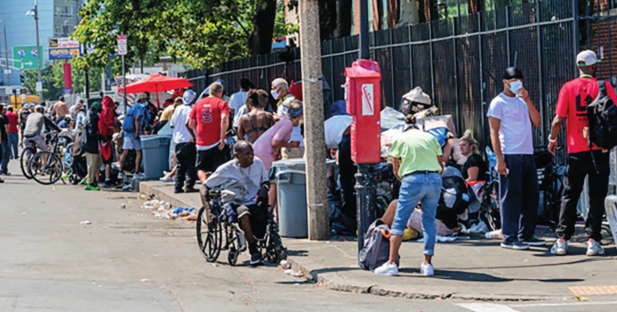
Brian McCarter is matter of fact when talking about what life near Boston Medical Center is like these days.
“A good weapon of sufficient danger like a knife or hatchet gets a police response in about five minutes if it’s visible,” he told The Boston Guardian. “A crowd of 40 gets a response in about 15 or 20 minutes, 45 minutes if there’s ten plus people. Needles are pretty fast. If you’re looking for power washing to clean up human poop and pee, there’s barely a response at all.”
Issues with homelessness and drug trafficking aren’t new to the South End, but this year’s warm weather surge has been accompanied by a continued enforcement crackdown around the epicenter of Mass and Cass. It’s driven overall illicit activity down compared to years past, but that’s cold comfort to residents on the edges watching it surge around their homes.
McCarter says he often has to call city services or police multiple times per day to clean up used needles, disperse crowds blocking the sidewalk or deal with people getting aggressive with pedestrians.
Incident
counts from the Newmarket Business Improvement District’s private
security teams have risen from roughly 500 in the winter to more than
900 in March and almost 1,500 in May.
The
city’s tack toward harsher enforcement, begun November 2023 with the
encampment ban, has continued and expanded in recent months to encompass
the Downtown. Those efforts, however, are concentrated in hotspots, and
with many of the city’s larger rehabilitation programs shuttered
without federal ARPA funds the underlying causes of homelessness and
addiction have few solutions in sight.
For
people living on the edges of those enforcement hotspots, it can seem
like the city is just shuffling Boston’s most vulnerable around, often
onto residents' doorsteps or right into the hands of those looking to
prey on them.
“Drug
use is constant. About every three days I have to call in an overdose
and get an ambulance out here because someone is passed out unresponsive
on the sidewalk,” McCarter said. “You get a little desensitized because
it’s constant. People around here feel like we’re not being heard. My
neighbors don’t even bother calling [the police] half the time anymore
because nobody responds. People are just giving up and leaving.”
That’s
not to say the city doesn’t have any near-term plans to improve the
area. South End Representative John Moran, civic groups and residents
have all been informed that there is a long-requested bike patrol
beginning operation as soon as police can finish training and outfitting
them.
Police declined
to comment on the change, but Moran and South End Forum head Steve Fox
confirmed it is planned to start in the near future. Fox, following a
discussion with Superintendent Robert Ciccolo, said that six officers
currently assigned to foot patrols are being retrained and reequipped to
conduct bike patrols instead.
Fox
and other local civic groups have requested a bike patrol for years,
preferring its fast response and quiet approach to foot or car patrols.
It’s not exactly the new personnel they were hoping for, but he was
heartened that the officers and the superintendent were listening to the
community and adapting police responses to local needs.
What
the city will do in the medium and long term is less defined. Mass/Cass
civic working group heads, local political representatives and city
officials plan to meet in the coming weeks for new talks to discuss
addiction recovery options, public safety and the possibility of a
dedicated drug court serving Boston.
City
officials have made progress toward rebuilding the bridge to Long
Island, but the bridge and derelict facilities are still years away at
best. Funding the facility reconstruction is another question that’s yet
to be answered, with an estimated cost of more than half a billion
dollars in the 2010s . Since then, construction and materials costs are
likely to have risen substantially.
One
of the strongest requests from residents and civic groups in recent
years has been some sort of interim recovery campus where those seeking
addiction treatment can stay in the meantime. The proponents have been
consistently unable to find a site the city approves of, but in the
coming multi-party meetings civic groups hope to find the mayor’s office
more sympathetic.
“Each
day residents of [Worcester Square] continue to encounter new
nightmares from the addicts,” John Stillwaggon, co-president of the
Worcester Square Area Neighborhood Association, said in a statement.
“Needles, human excrement, overdosed individuals, drug deals, random
screaming, belligerence, shoplifting, panhandling... the list goes on.
Urban living comes with challenges, but this is beyond the pale. How
much longer must a neighborhood remain a victim of this apocalypse?”